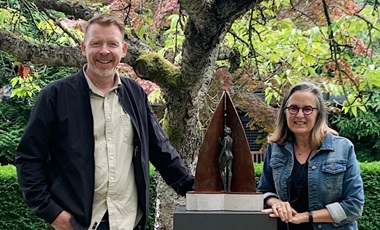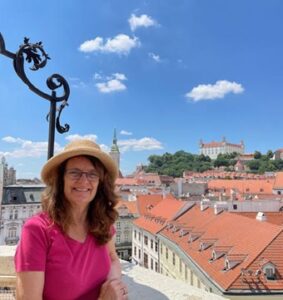
An October 5 talk will consider how Lise Struthers and David Robinson honed Limina, a bronze and steel image that evocatively portrays her experience of grief.
An October 5 talk on the collaborative conception, evolution and creation of the bronze and steel monumental work titled Limina by artist Dave Robinson will be held at St. John’s Shaughnessy Anglican Church.
How does one express the inexpressible? Especially when the most honest words we can come up with seem to breach a taboo. No one wants to hear about death, so grief becomes a little embarrassing, even shameful.
As a preteen I became adept at shifting the conversation so I wouldn’t have to tell people my dad had died. I didn’t want to have to reassure or rescue them, as they recovered from the shock and awkwardness of having stumbled into death-talk.
It’s different for me now. My husband of almost 30 years died in 2020 and I reentered a fresh world of grief. As an adult and a widow, I’m much more comfortable swimming in awkward waters, but I still lack the right words to convey the contours of grief, to describe the layers of loss I experience.
When words fail, art can help. Patrick Bringley who, after his brother died, quit his job and became a guard at the Metropolitan Museum of Art, writes, “A work of art tends to speak of things that are at once too large and too intimate to be summed up, and . . . speaks of them by not speaking at all.”
In my own experience of grief, too many words crashing around in my head like panicky birds flying into windows were giving me headaches. A spiritual director described the cause of my headaches this way: seemingly contradictory truths battling for space in my frontal cortex. God is good; I am devastated. Jesus heals; sometimes he doesn’t. The Lord is with those who suffer; what does it matter? My wordiness and wordlessness overwhelmed me.
But art helps.
The poet Christian Wiman tells us, “Art is so often better at theology than theology is.” For me, in my grief, the theology present in art has often been more satisfying than the theology available to me in words. I’ve come to understand that in this, I am not alone. The scriptures remind us of the importance of art.
‘I have filled them with the Spirit of God, with wisdom, with understanding, with knowledge and with all kinds of skills – to make artistic designs for work in gold, silver and bronze, to cut and set stones, to work in wood, and to engage in all kinds of crafts.’ Exodus 31:3-5
Sometimes art is our guide and companion in grief as it was for Bringley. Other times, art is an expression of grief or our surrender to it. For two years after the sudden death of her husband, Lise Struthers spent a few hours every Saturday in the place in her home where her husband had died, contemplating, feeling and wrestling with grief.
In that actual physical space, and in the spiritual, liminal space as well, a vision presented itself. She brought her vision to her friend, well-known Vancouver sculptor, David Robinson. Over 18 months, they honed a bronze and steel image that evocatively portrays Lise’s experience of grief.
This work of art now sits tucked into the Garden of Remembrance at St John’s Shaughnessy Church. Limina is a larger-than-life sculpture of a woman shrouded by a veil looking into the space between life and death and toward what is beyond.
David Robinson describes it like this:
This bronze and steel sculpture comes to us by the inspired vision of a gracious spiritual pilgrim. Looking back on its conception and unfurling, I’ve come to see Limina as a work of strange remote beauty, now even stranger to my own eyes.
Smuggled here from afar (as any worthy artwork should be) I think of Limina as a gift like a rare and burnished bronze coin from a foreign realm: the wordless country of grief.

Susie Colby
Limina invites us into a space that words cannot reach. Limina invites us individually or together into that wordless unknown country. And yet, as the sculpture reveals, the light gets through again and again in our long wandering through the wilderness of grief.
Susie Colby has held many roles in InterVarsity Christian Fellowship. She has lived in Vancouver for over 20 years, and with her late husband Steve raised three kids and a few pets here. This land where everything grows and blooms feels like home.
This piece first appeared on the City in Focus site.

As a person with longstanding interest in aesthetic delight, and also in Judaeo-Christian sacred literature, I started to wonder about the turn from a trouble with words to a quoting of three verses from Exodus 31.
In that isolated passage, the focus is on “to make artistic designs.” In the King James, the phrase is rendered “to devise cunning works.” In Hebrew, the phrase is a cognate accusative, a rhetorical device where the verb [חָשַׁב / chashab] is recapitulated in its object. “To devise devices” would provide one possible very literal englishing. The same cognate accusative is found in Esther 8:3.
Exodus seems concerned only with skill and craft directed to the purpose of following the Lord’s instructions in fabricating the tabernacle and its related elements.
We dwell in Vancouver, where devotees of art now strive mightily to build a $600 million temple at Larwill Park – a storehouse for unique fungibles and an arena for their exhibition. What is art?
Magnificent creation of sensitivity and love.
What a beautiful response to this invitation to be inspired by another person’s spiritual path through grieving!
Thank you, David.